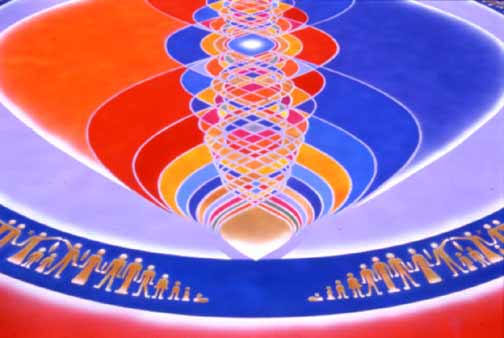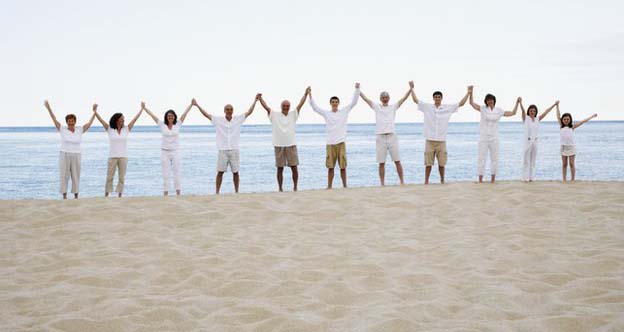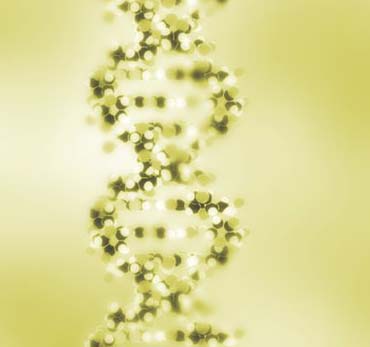

Did you ever pay attention to the friends you attracting into your life? If reality is a programmed hologram - and everything we do is based on our DNA codes - it would stand to reason that the friends we attract are here for the same learning lessons and experiences. For as long as we are programmed for the experience, these friends will stay in our lives. They may drift away and we attribute that to the changes in our lives as DNA codes update. Sometimes, for some inexplicable reason, they are suddenly gone and we are left to wonder why. It all goes to one's genetically encoded programming. The same can be said of romantic relationships and others that emotionally touch our lives.

A study from a controversial pair of US researchers claims that we are more genetically similar to our friends than we are to strangers. Looking at differences between nearly 2,000 people, recruited as part of a heart study in a small US town, they found that friends shared about 0.1% more DNA, on average, than strangers. While small, this is the same level of similarity expected for fourth cousins.
Other scientists are skeptical about the paper, which was published in PNAS. "I think that they're unusual findings, and that usually draws criticisms from scientists," said Prof James Fowler, one of the study's authors and a professor of both medical genetics and political science at the University of California, San Diego.
Together with Prof Nicholas Christakis from Yale University, Prof Fowler analyzed nearly 500,000 single-letter markers from across the genome, using data from the Framingham Heart Study. These results were useful because as well as providing DNA samples, participants were asked who their closest friends were. "Because the study started in a small community, many people that were named as friends, also happened to be involved in the study," Prof Fowler explained.
So he and Prof Christakis calculated a "kinship coefficient" using the genetic markers from pairs of friends and strangers, and found that it was slightly higher among friends. "We're not really making claims about specific candidate genes here," Prof Fowler told BBC News. "We're making claims about structural characteristics across the entire genome."
Disputed Conclusions
Other researchers have expressed concern about different factors that could affect the results - such as ethnicity or other types of "population stratification" - which could make people both genetically similar and more likely to be friends.
Prof Evan Charney from Duke University, who has criticised earlier research by Fowler and Christakis, said this type of analysis only works if none of the subjects are related to each other at all, which is difficult to confirm. "These studies depend upon that assumption - that you're looking at thousands of people who are not related," he told the BBC.
The authors, however, tried to allow for any stratification or family relationships within their population, in a smaller comparison of 907 pairs of friends, this time including nearly 1.5 million genetic markers. "We excluded any one of them that had any relatedness whatsoever," explained Prof Fowler. "We didn't want anyone to think that this was just being driven by people who were accidentally friends with their fourth cousins and didn't tell us."

The study compared one-letter differences known as "single nucleotide polymorphisms"
Dr Rory Bowden, a statistician and lecturer at the Wellcome Trust Centre for Human Genetics in Oxford, also expressed reservations about whether the study could be confounded by very subtle genetic population structure. "I wonder whether these methods can fully account for factors known to drive friendships, like church membership, sports or other cultural affinities, that would also lead to a correlation with genotype because they reflect differences in places of origin within Europe of the Framingham participants," he said."
Prof Charney further points out that studies like this can over-emphasise the importance of our DNA sequence itself. "People do not have the same genome in all the cells and tissues of their body," he said.
With some exceptions, like the mutations that cause rare genetic diseases, Prof Charney argues that even in great numbers, the single-letter genetic markers used in studies like this one have not proved very informative about human traits and behavior. But the study's authors remain confident. "Most people don't even know who their fourth cousins are! Yet we are somehow, among a myriad of possibilities, managing to select as friends the people who resemble our kin," said Prof Christakis.
Friends Have More DNA in Common than Strangers Live Science - July 14, 2014
People may unsuspectingly choose friends who have some DNA sequences in common with them, a new analysis finds. Researchers compared gene variations between nearly 2,000 people who were not biologically related, and found that friends had more gene variations in common than strangers. The study lends a possible scientific backing for the well-worn clichˇs, "We're just like family," or "Friends are the family you choose," the researchers said.
"Humans are unique in that we create long-term connections with people of our species," said Nicholas Christakis, a social scientist at Yale University involved in the study. "Why do we do that? Why do we make friends? Not only that, we prefer the company of people we resemble." The researchers did the study because they wanted "to provide a deep evolutionary account of the origins and significance of friendship," Christakis said.
The new study is based on data from the Framingham Heart Study, which is a large, ongoing study looking at heart disease risk factors in the people living in one town: Framingham, Massachusetts. The researchers looked at data on people's DNA, as well as who was friends with whom.
After analyzing almost 1.5 million markers of gene variations, the researchers found that pairs of friends had the same level of genetic relation as people did with a fourth cousin, or a great-great-great grandfather, which translates to about 1 percent of the human genome.
The most common gene shared by friends was the "olfactory" gene, which is involved in a person's sense of smell. Although 1 percent may not sound like much, Christakis said in a statement, "to geneticists it is a significant number. He said, "Most people don't even know who their fourth cousins are, yet we are somehow, among a myriad of possibilities, managing to select as friends the people who resemble our kin."
The findings suggest that choosing friends who share similar genes is a behavior that may have contributed to human evolution, the researchers said.